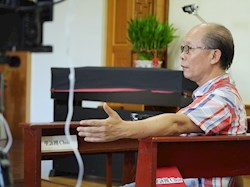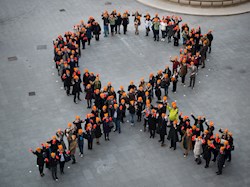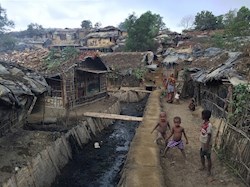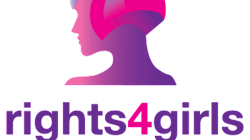Criminal Justice and Human Trafficking
May 26, 2016
Caleb Benadum
Opinion
�
Policy Making
The issue of human trafficking is the premier human rights issue of our time. But it's not just about enforcing human rights, it's about strengthening and using criminal justice systems to prosecute traffickers and rehabilitate survivors. This month we focus on some of the TIP Heroes who are prosecutors and judges, working in the system to combat this horrific crime.
In 1901, an archaeological team led by Jacques de Morgan discovered a large, seven-foot tall piece of basalt in a small province in Iran. The basalt stele was covered in writing. After a year, they were able to publish a translation of the text, which made up what is now called Hammurabi’s Code. Along with the Old Testament, the Code is one of the oldest records of criminal law in ancient times. The code describes various offenses against others and against the community, and prescribes adequate punishments.
Our modern legal systems are much more sophisticated and nuanced, but the principle remains the same. A crime is an offense committed against another or against our community standards. In the United States, the legislatures and judges have come up with adequate penalties, called sentencing guidelines, for various crimes. Human trafficking is a crime. It is a monstrous crime. Addressing this issue requires well-drafted criminal laws and functioning criminal justice systems. Not only do we need policy that helps us pursue traffickers, but we need prosecutors who are trained, judges who are sensitive to survivors, and police officers who can collect the proper evidence.
That is why we are celebrating TIP Heroes who are criminal justice professionals during the month of December. TIP Heroes include Marcelo Colombo, a sharp prosecutor from Argentina who pursues traffickers in court, as well as Tek Narayan Kunwar and Swati Chauhan, both judicial officers who have focused on how their decisions affect and can empower survivors.
Prosecution and Modern Slavery
The first step in any prosecution is victim identification. In the United States, this often happens when a police officer identifies a person prostituted in the commercial sex industry or when a person reports something strange. There are a range of identifiers that help determine if you have come across a victim of human trafficking. When in doubt, please call the Polaris Project hotline at 1 (888) 373-7888 (or see if there is a hotline in your country). They have trained operators who will talk you through what you are seeing. Once a victim is identified, the police must be involved. They will take over any investigation and help prepare a case against the human trafficker. Sometimes, the trafficker still needs to be identified, so the police will conduct an investigation to track down the perpetrator.
The police will then present that evidence to the prosecutors who will decide if they have enough evidence to open a prosecution or issue an indictment. I am currently talking about the U.S. system, but these elements are often found in other countries. The prosecutor will continue to cooperate with police as the investigation continues. They file a case before the applicable criminal court, and a judge is appointed to the case. At that point, the trafficker is arrested, and the survivor is hopefully directed to adequate aftercare facilities. The prosecutor proceeds with a case before the court, presenting the evidence that they and the police have gathered on the guilt of the trafficker and his crimes. After the presentation of evidence, the judge makes a decision on the guilt of the offender and what penalty to assign.
There are numerous examples among the TIP Heroes of dedicated and passionate police officers who are conducting incredible investigations into trafficking and modern slavery. Patience Quaye of Ghana, Katrin Gluic of Croatia, Moses Binoga of Uganda, George Vanikiotis of Greece, Juan Victoriano Ruiz of Nicaragua, and Paul Holmes of the UK. Their efforts are critical to the work of this month’s featured prosecutors and judges. Marcelo Colombo leads the Specialized Office for Investigation of Kidnapping and Trafficking in Persons’ cases (UFASE) in Argentina. His extraordinary efforts resulted in the first conviction of a human trafficker in Argentina in 2009. But he has also taken steps to implement better policy, train fellow prosecutors, and attempt to make sure that survivors are treated with respect and dignity at all levels of the process. Read more about Marcelo on his profile here.
Judicial Officers and Human Trafficking
Just as we need competent prosecutors in order to effectively combat modern slavery, we must have committed judges. Judges and magistrates see a variety of different cases that all involve different types of laws and issues. If a judge is not sensitive to the individual issue of human trafficking, he or she can fall prey to old assumptions and myths that are unfortunately still common around the world. Many sex workers are still prosecuted by misinformed prosecutors and sentenced by misinformed judges.
Swati Chauhan is a great example of a magistrate appointed to a specialized position. Many courts and systems around the world have made efforts to provide specialized courts for human trafficking issues. Specialized docket courts can take several forms, but in Magistrate Chauhan’s case she was assigned cases that arose under a specific law. The Immoral Trafficking Prevention Act is the law that criminalizes human trafficking in India. Cases that arose under that law in the metropolis of Mumbai were assigned to her court. When she received her assignment, the court had a backlog of over 1,500 cases. She cleared that backlog and convicted over 200 traffickers just in 2010 and 2011. Read more about Magistrate Chauhan on her profile here.
Tek Narayan Kunwar is an example of a judge in a general court of law that has passionately pursued human trafficking issues. He is a district court judge in Lalitpur, Nepal. He has always handed down appropriately severe sentences to human traffickers. He developed policies in order to increase survivor sensitivity in his court, including holding regular hearings in order to update survivors on their cases and ensuring that cases were handled efficiently and quickly.
Human trafficking is a heinous crime. If we are to effectively address the injustice of slavery in our lifetime, we must make sure that criminal justice professionals are adequately trained. We need more prosecutors like Marcelo Colombo and judges like Magistrate Chauhan and Judge Kunwar.
This article was originally posted on TipHeroes.org
Topics:
Policy Making












